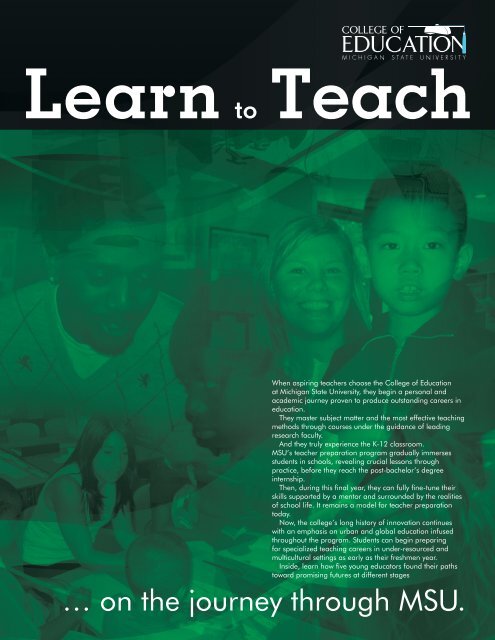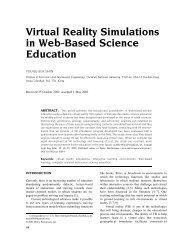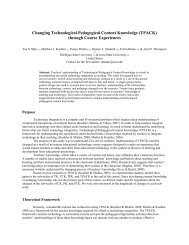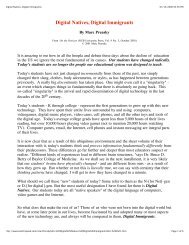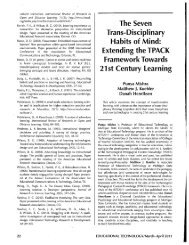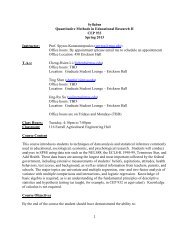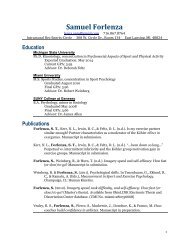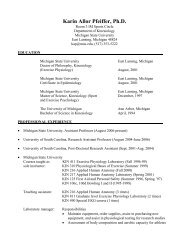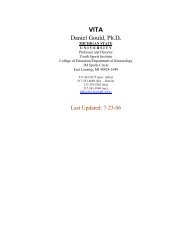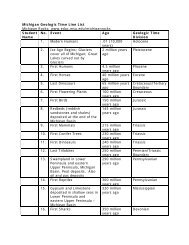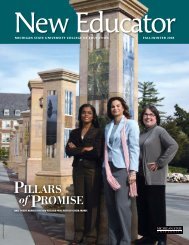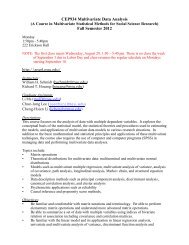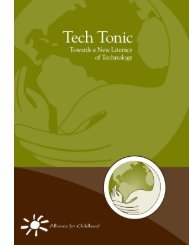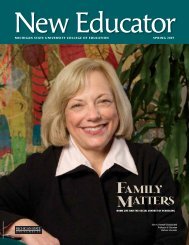Learn to Teach - College of Education - Michigan State University
Learn to Teach - College of Education - Michigan State University
Learn to Teach - College of Education - Michigan State University
Create successful ePaper yourself
Turn your PDF publications into a flip-book with our unique Google optimized e-Paper software.
<strong>Learn</strong> <strong>to</strong> <strong>Teach</strong>When aspiring teachers choose the <strong>College</strong> <strong>of</strong> <strong>Education</strong>at <strong>Michigan</strong> <strong>State</strong> <strong>University</strong>, they begin a personal andacademic journey proven <strong>to</strong> produce outstanding careers ineducation.They master subject matter and the most effective teachingmethods through courses under the guidance <strong>of</strong> leadingresearch faculty.And they truly experience the K-12 classroom.MSU’s teacher preparation program gradually immersesstudents in schools, revealing crucial lessons throughpractice, before they reach the post-bachelor’s degreeinternship.Then, during this final year, they can fully fine-tune theirskills supported by a men<strong>to</strong>r and surrounded by the realities<strong>of</strong> school life. It remains a model for teacher preparation<strong>to</strong>day.Now, the college’s long his<strong>to</strong>ry <strong>of</strong> innovation continueswith an emphasis on urban and global education infusedthroughout the program. Students can begin preparingfor specialized teaching careers in under-resourced andmulticultural settings as early as their freshmen year.Inside, learn how five young educa<strong>to</strong>rs found their paths<strong>to</strong>ward promising futures at different stages… on the journey through MSU.
“It <strong>to</strong>ok me from wanting <strong>to</strong>be a teacher <strong>to</strong> feeling it’ssomething I need <strong>to</strong> do.”Chris<strong>to</strong>pher Was<strong>to</strong>n and Ramadhani MusaGetting StartedFast track <strong>to</strong> urban teaching, fueled by passionChris<strong>to</strong>pher Was<strong>to</strong>n has been flying heartfirst <strong>to</strong>ward his future career path.Since arriving at <strong>Michigan</strong> <strong>State</strong> <strong>University</strong>,the aspiring math teacher men<strong>to</strong>redstruggling readers at a local elementaryschool. He traveled <strong>to</strong> Chicago <strong>to</strong> <strong>to</strong>ururban school settings. He even co-foundeda student group that inspires young men <strong>to</strong>pursue teaching.And freshmen year is barely behind him.The Urban Educa<strong>to</strong>rs Cohort Program(UECP) gives participants the jump-startthey will need <strong>to</strong> teach in under-resourcedcommunities, typically exposing them <strong>to</strong>hands-on learning experiences much earlierthan other future teachers.Was<strong>to</strong>n, a member <strong>of</strong> the second UECPcohort, says his commitment <strong>to</strong> the pr<strong>of</strong>essionis already unchangeable.“It <strong>to</strong>ok me from wanting <strong>to</strong> be a teacher<strong>to</strong> feeling it’s something I need <strong>to</strong> do,” hesaid <strong>of</strong> the group’s discussions. “My eyeswere opened <strong>to</strong> more than just math.”That was the subject area he excelled inas a high school student, and the basis <strong>of</strong>an extracurricular tu<strong>to</strong>ring position that firstshowed the Detroit teenager how powerfulpupil-teacher connections can be. Whenhe encountered teacher education facultymembers from MSU’s <strong>College</strong> <strong>of</strong> <strong>Education</strong>,during an on-campus summer programand later with UECP, he wasn’t surewhat <strong>to</strong> expect.Soon, through specialized coursesand activities, they showed the openmindedand successful graduate <strong>of</strong> Detroit’sRenaissance High School an educationalperspective beyond subject-mattermastery – the social justice side <strong>of</strong> teaching.“It’s a tragedy that we have so manyschool districts that don’t have adequateresources,” Was<strong>to</strong>n said, and counted thecontroversial issues on his fingers: low-incomehousing, bias in standardized testing,school closures, in<strong>to</strong>lerance…After growing up in an urban environment,he realized he had been surroundedby the risks but undeterred. He hopes <strong>to</strong>return there as a teacher.“For a lot <strong>of</strong> students, even a lot <strong>of</strong> myfriends, these issues affected them and Ithink they affect them <strong>to</strong> this day. That reallykeeps them from achieving <strong>to</strong> their highestpotential… But I’ve seen that this isn’t just aDetroit problem.”Like all UECP students, Was<strong>to</strong>n wasplaced in a Lansing, Mich. school nearMSU’s campus once weekly for anearly field experience. He ended uphelping one boy, Ramadhani Musa, moveup several reading levels through oneon-onetu<strong>to</strong>ring. He also, unfortunately,sometimes witnessed the kinds <strong>of</strong> unproductiveadult behaviors he learned about inhis courses.“Those types <strong>of</strong> things just happen overand over. People talk terribly <strong>to</strong> kids,” hesaid. “I see that and I think, that’s how I willnever be.”For now, Was<strong>to</strong>n plans <strong>to</strong> “soak up asmuch about urban education as possible,”continuing through a program that willinevitably expose him <strong>to</strong> more inspirational– and advantageous – experiences.This summer, Was<strong>to</strong>n served as a supervisingmen<strong>to</strong>r <strong>of</strong> high school students (andtheir elementary-age mentees) during apilot research project. He was invited <strong>to</strong>participate by MSU graduate students andfaculty members with whom he has developedrelationships.“They see the potential in me,” Was<strong>to</strong>nsaid. Similarly, “I want <strong>to</strong> be there for myfuture students, <strong>to</strong> do as much as I can <strong>to</strong>make sure each <strong>of</strong> them has the opportunity<strong>to</strong> really excel.”
Kristin Guina and JoAnne West“There are so many extrathings you can do here <strong>to</strong>help yourself get prepared.”Before the internshipAn ultra-fulfilling four yearsKristin Guina is still on a “placement high”as she joins a friend <strong>to</strong> catch up one springmorning. She has just learned, after fouryears <strong>of</strong> studying and preparing, where shewill spend the crucial final year fine-tuningher teaching skills before helming her ownclassroom.“I couldn’t sleep last night,” she tells fellowfuture educa<strong>to</strong>r JoAnne West, who, byall accounts, was equally as excited whenshe received her internship details – onMarch 26, <strong>to</strong> be exact. “I love that youremember the date,” Guina says, and theylaugh <strong>to</strong>gether.The young women, who were honoredby <strong>Michigan</strong> <strong>State</strong> <strong>University</strong>’s Board <strong>of</strong>Trustees for high academic achievement,have just graduated from the <strong>College</strong> <strong>of</strong><strong>Education</strong>’s baccalaureate program. Theythrive on seeing children grow and, likemany MSU teacher candidates, found theirniche for content-area interests and peercamaraderie early on. By senior year, their“TE family” (including two other students)got <strong>to</strong>gether for a girls movie night everyWednesday. More than a funny film, it wasa chance <strong>to</strong> talk about lesson plans <strong>to</strong> tryand life goals <strong>to</strong> reach.“That started second semester, whenthings got a little more stressful,” Westexplains. The social ritual was among manyavailable extracurricular activities,organized or otherwise, they sought out <strong>to</strong>enrich their experience in MSU’s alreadydynamic, high-quality teacher preparationprogram.Guina volunteered for Friendshop – anafter-school program run by MSU students– during fall <strong>of</strong> her sophomore year. Byspring, she was supervising all daily activitiesfor about 40 elementary kids.“The opportunity <strong>to</strong> be in front <strong>of</strong> a lo<strong>to</strong>f kids and be a leader was really valuable,”she said. “There are so many extrathings you can do here <strong>to</strong> help yourself getprepared.”Meanwhile, West, through an assistantshipfor a research faculty member, landedpermission <strong>to</strong> observe a local teacher’sclassroom all day once weekly. It was onlyfreshmen year and the particular pr<strong>of</strong>essionalshe watched, in her words, demonstratedan amazing ability <strong>to</strong> successfullyintegrate all students.West and Guina attended panel presentationsand service-learning excursionsas part <strong>of</strong> Kappa Delta Pi, the internationalhonor society in education, and the Student<strong>Michigan</strong> <strong>Education</strong> Association (SMEA).They spent a summer immersed in urbanteaching challenges through the BroadPartnership with Detroit Public Schools.They added Honors <strong>College</strong> projects <strong>to</strong>their teacher education classes.Why do so much?For the same simple reason they chose <strong>to</strong>attend MSU.“We both really want <strong>to</strong> be greatteachers,” West says. “You can set highstandards for yourself and reach them.”Likewise, “you need <strong>to</strong> set the bar high foryour students.”So, add substitute teaching and fieldexperiences they encountered as requirements<strong>of</strong> coursework – spending nearly asmuch time in local schools as in on-campusclasses – and both West and Guina saythey stand prepared for the job.Well, at least for the fifth-year internship,during which they will most likely sharepost-B.A. courses and definitely the continuingbonds <strong>of</strong> colleagues. Guina is headed<strong>to</strong> Midway Elementary in Holt, Mich., West<strong>to</strong> Bennett Woods Elementary in Okemos,Mich. But they are both going <strong>to</strong> teachsecond grade.“We get <strong>to</strong> co-plan again.”
“It helped me reallyunderstand the importance <strong>of</strong>teaching global citizenship.”Pam Arnold at 3e International KindergartenAwesome internship<strong>Learn</strong>ing confidence and multiculturismPam Arnold couldn’t regroup with fellowteaching interns during the school day.There wasn’t a Target around the corner, afamiliar Meijer or OfficeMax selling materialsfor last-minute lesson ideas. Englishwas the native language <strong>of</strong> only three kidsin her class. For some, it was their thirdor fourth language. And they were only 5years old.She loved it.All challenges included, spending theyear at 3e International Kindergartenwas the valuable foreign adventure shedreamed about. Guiding children fromthe alphabet through their first sentencescemented her fascination with young languagelearners.Arnold experienced an unusual teachinginternship abroad, thousands <strong>of</strong> miles fromMSU’s placement sites near Detroit, GrandRapids and Lansing, Mich.“It’s been an eye-opening experience, <strong>to</strong>see the growth take place in learners fromall different levels and walks <strong>of</strong> life,” shesaid. “The diversity there is so prevalentit’s impossible <strong>to</strong> ignore.”3e sits in the heart <strong>of</strong> Beijing, China andthe students come from 18 nations. Underan innovative model developed by MSU’sU.S.-China Center for Research on <strong>Education</strong>alExcellence, the students split daysbetween learning in the Mandarin and Englishlanguages and, likewise, through bothEastern and Western teaching styles andcultures. Speaking in English right away,Arnold knew, wouldn’t be effective for thevaried group <strong>of</strong> tiny pupils.“I had <strong>to</strong> model and imitate everything,”she said, remembering how she reliedon body language and facial expressionsforeshadowed in her courses. “I think Iwould have felt more awkward if I hadn’tjust gone in and done it.”Arnold <strong>to</strong>ok that just-do-it approach <strong>to</strong>the entire excursion. As an undergraduate,the child development major admired thediversity among her classmates. She spentspare time tu<strong>to</strong>ring English learners andsoon decided that she must, in her futurecareer, do her part <strong>to</strong> prepare students forglobal citizenship.“I’m not scared <strong>to</strong> venture out and trynew things,” Arnold said. “I wasn’t alwayslike that; it started in college when I realizedI wanted <strong>to</strong> see the world.”Preparing teachers <strong>to</strong> work in internationaland multicultural contexts is a priorityfor the <strong>College</strong> <strong>of</strong> <strong>Education</strong>. In fact, thefirst participants <strong>of</strong> a new Global Educa<strong>to</strong>rsCohort Program begin classes in fall 2008.Officials are interested in pursuing moreteaching internships outside the U.S.“Our college is trying <strong>to</strong> put a lot moreinternational focus in<strong>to</strong> the program,” saidCoordina<strong>to</strong>r Sharon Schwille. “This is possiblyone way <strong>to</strong> do it.”Arnold said being in the classroom withher men<strong>to</strong>r teacher and students <strong>to</strong>ok heron a pr<strong>of</strong>ound pr<strong>of</strong>essional journey.The most basic go<strong>of</strong>-ups became lastinglessons: Her men<strong>to</strong>r cringing as shedistracted kids from math concepts witha comment about different colored bingochips. She experienced trial and error –and success – in the delicate business <strong>of</strong>differentiating instruction for a diversestudent group. The experience reaffirmedher interest in kindergartners and ignitedone <strong>to</strong> learn more about second-languageteaching.“It’s an art really. It’s not something thatcan be taught in one class or one semester,”Arnold said. “Pr<strong>of</strong>essionally, (this internship)has helped me really understandthe importance <strong>of</strong> teaching global citizenshipand valuing other people, places andcultures.”
“I know I can teach anywhere.”Callie Sullivan and her classOut there after MSURisks and rewards on the educational path less traveledWith fresh confidence from her internshipyear, Callie (Clausnitzer) Sullivan <strong>to</strong>ld theprincipal she wouldn’t regret hiring her. Shewas in Harlem, New York and, for somereason, she felt an “instant connection”when she walked in<strong>to</strong> upbeat and colorfulPublic School 185.The MSU elementary education graduate’sfirst full-time teaching position, especiallyin this urban setting, wasn’t going <strong>to</strong>be picture-perfect, however.Her first-graders cursed and kicked. Supplieswere sparse. Family involvement waspractically non-existent.When it came time for parent-teacherconferences, Sullivan, who grew up insuburban Brigh<strong>to</strong>n, Mich., sat petrified andprepared for the worst.Until the parents started showing up.Nearly all <strong>of</strong> them.Many came <strong>to</strong> thank her for a differencein their children they had not seen before: achild now reading grocery signs and everythingelse he can find, a girl who created abehavior chart for her household.“Those thank-yous meant the world <strong>to</strong>me,” Sullivan said. She knew then, as shebelieved the first day, that she was exactlywhere she was meant <strong>to</strong> be.“I’m an intense and intelligent personwho went for the added challenge. I do wellwith what I teach, and I owe that <strong>to</strong> MSU.”After all, Sullivan had arrived at hercareer destination with a degree from thenation’s <strong>to</strong>p-ranked teaching school anda résumé that appeared <strong>to</strong> cover all points<strong>of</strong> the classroom experience spectrum:Observation <strong>of</strong> urban elementaryschools. Check. Interactions with kids frommultiple grade levels. Check. <strong>Teach</strong>ing allsubject areas in a suburban setting. Check.In between graduation and her full-yearinternship, she even managed <strong>to</strong> teachthree courses for some 150 youngsters inSouth Africa. The trip she participated inremains one <strong>of</strong> the summer study abroadopportunities organized specifically forMSU teacher candidates.“What I’ve learned is that kids are kidswherever you go and the major thing theyneed is love,” said Sullivan, who saw thestark contrast <strong>of</strong> different cultures and thedamage <strong>of</strong> condescending language inSouth Africa. She first foresaw the potentialpower <strong>of</strong> quality teaching through herown childhood learning struggles, and sheglimpsed how supportive and effective aU.S. school can be during her internshipyear in affluent Novi, Mich.MSU’s teacher preparation program facilitatedher diverse trajec<strong>to</strong>ry, ensuring thatshe knew the content, curriculum andmethods <strong>to</strong> be an effective educa<strong>to</strong>r ateach step. More importantly, Sullivan says,the faculty nurtured in her a desire <strong>to</strong> trulyand equally guide all learners <strong>to</strong>wardhigher expectations.“We were constantly reminded, aseducation students, <strong>of</strong> the honor we havein teaching our youth,” she recalled overthe phone one afternoon while the schoolyear, her first in the “real world,” began <strong>to</strong>wind down. “As emotionally draining as itcan be, knowing that I can be a positiveinfluence in these students’ lives and thatthese are the students who really need thatinfluence, makes it all worth it.”Her class <strong>of</strong> 18 children, with faces fromforeign countries and nearby impoverishedneighborhoods, with academic and socialstruggles and, now, with s<strong>to</strong>ries <strong>of</strong> lastingvic<strong>to</strong>ries, represents the accumulation <strong>of</strong> aproductive pr<strong>of</strong>essional education and thebeginning <strong>of</strong> a promising career ahead.“I’m confident that I can get throughanything after this year,” she said. “I know Ican teach anywhere.”
The teacher preparation program at <strong>Michigan</strong> <strong>State</strong> <strong>University</strong>:• Combines a baccalaureate degree, many available teaching majors and/or minor concentration areas, and teacher certificationcourses; followed by a full-year teaching internship in a public school• Requires undergraduate field experiences (about 175 hours) that connect theoretical principles with real-life practices; supportsthe use <strong>of</strong> technology in teaching; and requires interactions with special-needs students in regular classrooms• Provides graduate-level pr<strong>of</strong>essional instruction from MSU faculty while completing the internship (about 900 hours) with anexperienced men<strong>to</strong>r teacher, with some credits eligible for application <strong>to</strong>ward a master’s degree• Prepares graduates <strong>to</strong> achieve state-mandated certification as entry-level teachersGo urbanThe Urban Educa<strong>to</strong>rs Cohort Program (UECP) prepares committedstudents for the important and rewarding challenge <strong>of</strong> teaching inunder-resourced communities. Admitted as freshmen, participantsspend their first two years sharing specialized course sections andfield experiences that emphasize skills for meeting the needs <strong>of</strong> alllearners.www.education.msu.edu/urbancohort“Those who aspire <strong>to</strong> work in urbancontexts must understand issues <strong>of</strong> socialjustice, power, privilege and poverty, andthe critical role that educa<strong>to</strong>rs play inaddressing those issues for youth.”Sonya Gunnings-Mo<strong>to</strong>nAssistant Dean for Student SupportServices & RecruitmentGo globalThe Global Educa<strong>to</strong>rs Cohort Program (GECP) prepares educa<strong>to</strong>rs<strong>to</strong> teach in a variety <strong>of</strong> multicultural and international settings. Fortheir first two years at MSU, participants experience courseworkand activities that demonstrate how <strong>to</strong> teach students <strong>to</strong> be globalcitizens and <strong>to</strong> infuse teaching with global content, regardless <strong>of</strong>student characteristics or content area.www.education.msu.edu/globalcohort“We want our graduates <strong>to</strong> be globallycompetent and that means understandingother cultures, internationalizing thecurriculum and being able <strong>to</strong> work with adiversity <strong>of</strong> people and families.”Carole Ames<strong>College</strong> <strong>of</strong> <strong>Education</strong> DeanStudent Affairs Office134 Erickson HallEast Lansing, MI 48824-1034(517) 353-9680coesao@msu.eduwww.education.msu.edu


